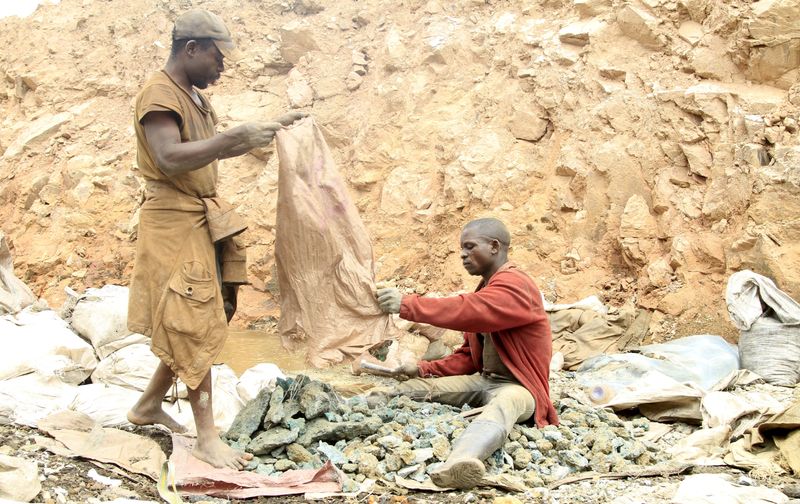CAPE TOWN (Reuters) - Microsoft (NASDAQ:MSFT) visited an artisanal cobalt mine in Democratic Republic of Congo in December as part of attempts to jump-start formalisation of the little-regulated and dangerous industry that experts say is key to meeting global demand for the battery material.
Congo accounts for three-quarters of the world's mined cobalt supply. Industrial mines produce most of Congo's cobalt, but "artisanal" miners, who dig by hand and often die when tunnels cave in, account for up to 30% of production, though that fluctuates depending on price.
In the first known visit by a Microsoft executive to an artisanal cobalt site in Congo, chief of staff for tech and corporate responsibility Michele Burlington met miners at Mutoshi, where commodities trader Trafigura had helped run a formalisation scheme that ended in 2020.
Companies that use cobalt in products from electric cars to smartphones should work to improve conditions at artisanal mines instead of seeking to cut artisanal cobalt out of their supply chains, an independent report on the visit argued on Wednesday.
"Electric vehicle manufacturers and electronics companies are operating with one eye open and one eye closed," said Dorothee Baumann Pauly, director of the Geneva Center for Business and Human Rights, who wrote the report.
"In practice it is virtually impossible for them to completely exclude artisanal cobalt, especially when it is sent to smelters and refiners in DRC and China."
Microsoft declined to reply to Reuters' questions about the visit or about its strategy on artisanal cobalt. In the report, Microsoft said that it is "committed to responsible and ethical sourcing".
"We are continuing to work on this problem. It's an issue that will take a coalition to solve," the $1.9 trillion computer manufacturer and software company said.
As consumers become more concerned that the products they buy are tainted by poor working conditions or child labour, global tech firms and carmakers have been using less mined cobalt in their batteries by increasing recycling and switching to lower-cobalt chemistries.
Apple (NASDAQ:AAPL), for example, aims to massively reduce its use of all materials sourced directly from mines, and has said that 13% of the cobalt shipped in its products in 2021 came from recycling.
The issues around artisanal mining are an existential threat to the cobalt industry, according to Marina Demidova, head of communications at the Cobalt Institute. "If we get this wrong, cobalt probably will cease to be in batteries in 20 years' time."
So far, attempts to formalise the industry have fallen flat.
Trafigura and Congo mining firm Chemaf's formalisation scheme at Mutoshi, launched in 2018, ended abruptly in March 2020 with the coronavirus pandemic. Now diggers work in deep tunnels with no personal protective equipment, and women miners said they make less money than before, according to the report.
Entreprise Generale du Cobalt, a unit of state mining company Gecamines, was granted a monopoly on artisanal cobalt by government decree. EGC signed a supply deal with Trafigura in November 2020 and published a sourcing standard, but has yet to start buying cobalt due to political wrangling.
"Greater stakeholder engagement, including from global buyers, will help to overcome this impasse," Baumann-Pauly said.
